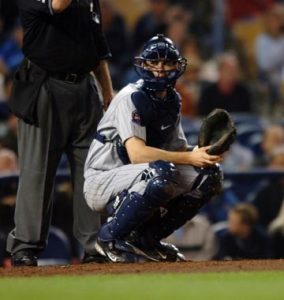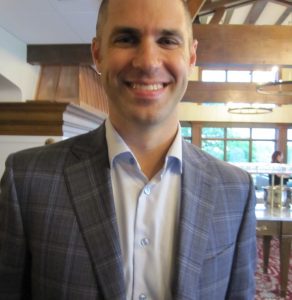Joe Mauer was the center of adulation on Saturday when he was inducted into the Minnesota Twins Hall of Fame during a ceremony at Target Field. Fans of all ages applauded the greatest catcher in franchise history whose crown jewel achievement could be acceptance into the National Baseball Hall of Fame in Cooperstown, New York. He is eligible to be voted into baseball immortality in 2024.
Some of those who lustily cheered Mauer this weekend were also his critics several years ago. Time will not forget that the hometown hero had two distinctly different eras with the Twins. From 2004-2013 he was a god in Minneapolis-St. Paul, on the Minnesota prairie and environs beyond. But the seasons from 2014 through his last year of 2018 were not so kind as part of Mauer nation cracked and turned on him.
Joseph Patrick Mauer was practically a household name in Minnesota even back in high school at Cretin-Derham Hall in the late 1990s. He was terrific on the basketball court, a five-star college quarterback prospect and so coveted in baseball he became the first overall selection in the 2001 MLB Draft. The Twins chose Mauer over pitcher Mark Prior and it was a wise decision because spurning the local kid for a guy who had a mediocre career on the mound would have been a disaster.
By 2004 Mauer was the team’s starting catcher and taking the first steps of a legendary 15-year career in the majors, all with the Twins. Between his rookie season and the turning point year of 2014, the 6-foot-4, left-hand hitting Mauer won three American League batting titles, five Silver Slugger Awards and the 2009 AL MVP Award.
His 2009 season was the stuff of baseball immortals, hitting a career-high 28 home runs along with a .365 batting average and best-ever 96 RBI. He is the only AL catcher ever to win a batting title. Six times he was named an AL all-star.

Mauer was a two-way superstar during his glory years, a superb catcher who showed off a quarterback’s arm in targeting base runners and marvelous athleticism capable of even catching a foul ball behind his back or reaching behind the protective netting to snag a ball. He was a three-time Gold Glove winner as a catcher and probably deserved to win one after moving to first base late in his career.
Mauer’s early years were part of a tease by the team to become a World Series champion. The Twins, with Mauer and other young stars like Justin Morneau and Johan Santana, won division championships in 2004 and 2006, totaling 92 and 96 wins respectively. The club also won division titles in 2009 and 2010.
In the land of 10,000 lakes, native son Joe Mauer could seemingly walk on water. “Baby Jesus” became a nickname and was synonymous with a hero who was not only great but was one of us. Sports Illustrated twice made him a cover boy, referencing the possibility he could become baseball’s greatest catcher ever and also his pursuit to become the game’s first .400 hitter since 1941. And dating Miss America, Chelsea Cooley, only added to the coast-to-coast glitz associated with our guy Joe.
Making the whole story even better was Mauer remained Mauer. Deliberate in speech and humble in demeanor, he was and is an old-fashioned hero. The high character, strong and silent type America revered in the 1950s and 1960s. You never read about an irate Mauer throwing chairs or scattering the postgame buffet in the locker room because of a bad night on the field. His name didn’t show up in police blotters. He didn’t rip his teammates or strut around wearing gaudy jewelry to show off.
Joe could have been a first -round draft choice of the Boy Scouts, dependable and steady while living his life without pretense and doing the right things. “I am not as cool as I am supposed to be,” Joe might have said.
Mauer grew up in St. Paul with brothers Jake and Billy, raised by parents Jake and Teresa. “…Jake and Teresa raised their kids the right way. Family and ethics and honor and all that was a hell of a lot more important than even baseball,” said Ken Mauer Jr., the former NBA referee and Joe’s second cousin.
Not even Mauer’s $184 million contract could dent his rock-solid character and values. In 2010 he signed an eight-year deal that at the time was one of the richest in baseball history. There had been rumors the Twins might not be able to keep their superstar at home and speculation about how if he signed with the Red Sox he stood a better chance of playing in a World Series while tattooing his opposite field line drives off the “green monster” at Fenway Park.
The Twins weren’t about to let Mauer go elsewhere, though. The club had lobbied for a new ballpark on the premise more revenues would be used to acquire and keep talent. Opening Target Field in 2010 without No. 7 would have been a PR disaster for the ages.
The $184 million set Mauer up for life financially but injuries, missed playing time and declining performances in his early 30s changed the dynamic of how many fans viewed him. The most significant fork in the road came in August of 2013 when he suffered a season-ending concussion after taking a wicked shot to his face mask from a foul ball. He moved to first base in 2014 and only once hit over .300 before retiring at the end of the 2018 season at age 35 with a .282 average (lifetime .306). In 2016 he admitted to blurred vision at the plate as a result of multiple concussions.
Catching is the most demanding of baseball positions and Mauer’s physical problems had started even before 2013. He missed part of the 2011 season with something called bilateral leg weakness. The name of the ailment and inability to get on the field caused fandom to question Mauer’s willingness to play.
In the summer of 2014 Mauer’s hitting was sinking to new lows. Even grandfather Jake Mauer, a boisterous and colorful character who had helped groom Joe’s baseball skills as a kid, acknowledged the fan criticism in a Sports Headliners column in July. He understood the frustration Twins fans had with their $23 million per season first baseman and a team that had sunk into mediocrity.
“He’s getting a big salary, he should produce,” Jake said. “That’s what the fans think and that’s what the fans want. He’s trying but it just don’t happen (yet). But I don’t blame the people.”
Jake said Joe mentioned the possibility of being benched, and grandpa thought, too, the former American League batting champion should come out of the lineup. “But they can’t bench him because he’s making so much money. They gotta have him in the lineup,” the older Mauer said.
Joe’s woes in 2014 included an oblique injury but Jake acknowledged the seriousness of the concussion in 2013. “I think it has hampered him,” Jake said. “I really do.”

Big Jake, as family and friends called grandpa, passed away in 2020 at age 89. Then Joe lost his 66-year-old father in January of this year. As Ken Mauer Jr. put it in his interview with Sports Headliners, that’s way “too young” to lose a jovial man who was so beloved by everyone who knew him.
Ken Mauer and many others from the extended family were invited to this weekend’s celebration. “It certainly would have been wonderful if Jake had been able to be there,” Ken said. “He would be so proud and he always was.”
Minnesotans are justifiably proud of Mauer who was supported this weekend by so many who love him including his wife Maddie who went to high school with him. They live in the Twin Cities with twin daughters Emily and Maren and son Chip. Joe does some community work, but his focus is on being a dad and husband.
Mauer lived in Florida for a time, but Minnesota is where he belongs. He never wanted to play for any team but the Twins. Club president Dave St. Peter told Sports Headliners in 2019 the organization felt the same way. “No, that was never part of the dialogue with Joe,” St. Peter said about Mauer playing elsewhere. “We knew Joe wanted to be in a Minnesota Twins uniform and we wanted Joe to be in a Minnesota Twins uniform.”
And now Mauer is in the Twins Hall of Fame, just like even his critics knew he deserved to be.





